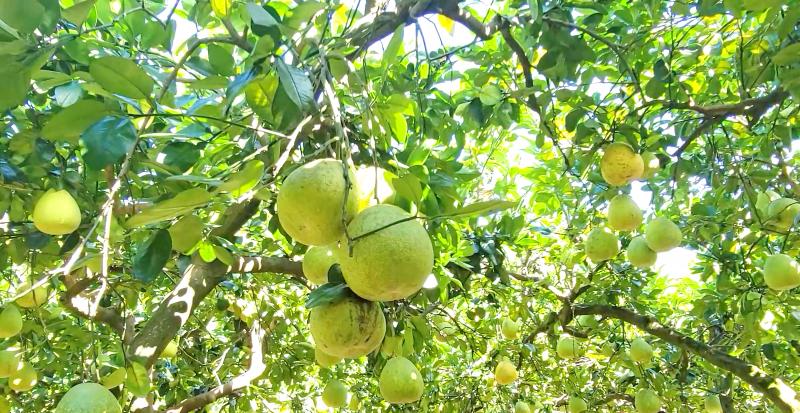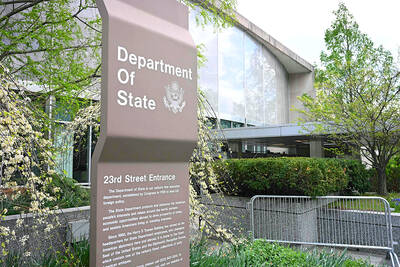Pomelo production is to fluctuate wildly over the next decade, growing steadily until plummeting by 40 percent as climate change affects temperatures and rainfall, Greenpeace Taiwan said on Thursday.
Taiwan produces an average of 74,000 tonnes of pomeloes per year with a steadily rising yield, averaging 13,000kg per hectare over the past five years, the environmental group said.
However, Greenpeace climate change models using data from the Central Weather Bureau and the Ministry of Science and Technology’s Taiwan Climate Change Projection Information and Adaptation Knowledge Platform show dramatic fluctuations in production over the next decade, it said.

Screen grab by Lu Hsien-hsiu, Taipei Times
If carbon emissions continue at their current pace, the two most important pomelo growing regions in the country — Tainan’s Madou District (麻豆) and Rueisui Township (瑞穗) in Hualien County — are to experience the worst production shocks in a century, it said.
Unstable weather could reduce yield from a peak of about 17,900kg per hectare in 2024 to about 12,600kg per hectare by 2029, a decline of 40 percent over a five year period, Greenpeace said.
The primary reason for this dramatic fluctuation is shown to be unstable low temperatures in June, with about 790kg per hectare lost for every 1°C of warming, it said.
June is peak growing season for pomeloes, during which time fluctuations in daily temperatures have a significant effect on fruit development and output, Greenpeace East Asia campaigner Liu Yi-chun (劉羿君) said.
From now until 2024, June temperatures are expected to fall, causing yields to climb, the group said.
However, in the five years that follow, temperatures are expected to rise, resulting in a drop in production from 2024 to 2029, it added.
This variation would directly affect growers’ income, with an oversupply in the next few years potentially tanking prices, followed by a collapse that would pose a challenge to supply and demand, it said.
Aside from rising temperatures, unsteady precipitation would also impact yields, Greenpeace said.
The group said that farmers told them that unstable weather patterns over the past four years have made it difficult to estimate the growing calendar, with typhoons arriving at unusual times and plum rains giving way to drought conditions.
Farmers’ livelihoods depend on the weather, leaving them especially vulnerable to climate change, Liu said.
The Council of Agriculture last month announced a NT$10 billion (US$360.54 million) annual fund to help farmers adapt to climate shocks, but some might never see the money without a plan for how local governments should distribute it, Liu added.
Greenpeace called on local governments to pass ordinances governing the distribution of federal assistance, as well as develop strategies to help farmers deal with climate change through assessing risk and ensuring access to water.

Hong Kong singer Eason Chan’s (陳奕迅) concerts in Kaohsiung this weekend have been postponed after he was diagnosed with Covid-19 this morning, the organizer said today. Chan’s “FEAR and DREAMS” concert which was scheduled to be held in the coming three days at the Kaohsiung Arena would be rescheduled to May 29, 30 and 31, while the three shows scheduled over the next weekend, from May 23 to 25, would be held as usual, Universal Music said in a statement. Ticket holders can apply for a full refund or attend the postponed concerts with the same seating, the organizer said. Refund arrangements would

Former president Tsai Ing-wen (蔡英文) on Monday called for greater cooperation between Taiwan, Lithuania and the EU to counter threats to information security, including attacks on undersea cables and other critical infrastructure. In a speech at Vilnius University in the Lithuanian capital, Tsai highlighted recent incidents in which vital undersea cables — essential for cross-border data transmission — were severed in the Taiwan Strait and the Baltic Sea over the past year. Taiwanese authorities suspect Chinese sabotage in the incidents near Taiwan’s waters, while EU leaders have said Russia is the likely culprit behind similar breaches in the Baltic. “Taiwan and our European

Taiwanese indie band Sunset Rollercoaster and South Korean outfit Hyukoh collectively received the most nominations at this year’s Golden Melody Awards, earning a total of seven nods from the jury on Wednesday. The bands collaborated on their 2024 album AAA, which received nominations for best band, best album producer, best album design and best vocal album recording. “Young Man,” a single from the album, earned nominations for song of the year and best music video, while another track, “Antenna,” also received a best music video nomination. Late Hong Kong-American singer Khalil Fong (方大同) was named the jury award winner for his 2024 album

The US Department of State on Monday reaffirmed that US policy on Taiwan remains unchanged, following US President Donald Trump’s use of the term “unification” while commenting on recent trade talks with China. Speaking at a wide-ranging press conference, Trump described what he viewed as progress in trade negotiations with China held in Geneva, Switzerland, over the weekend. “They’ve agreed to open China — fully open China, and I think it’s going to be fantastic for China. I think it’s going to be fantastic for us,” Trump said. “I think it’s going to be great for unification and peace.” Trump’s use of the